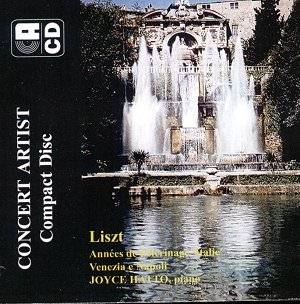One
of the facets of Joyce Hatto’s Liszt playing that I most admire
is her refusal to splinter fortes through over-projection or,
conversely, so to magnify and underline espressione markings
that emphases become gabbled and Lisztian syntax reduced to bombast
and tweeness. Her playing on the contrary is notable for its directness
and sensitivity, its powerful technique and colouristic vivacity
and she brings her considerable powers of characterisation to
bear on this set of Années de Pèlerinage. I prefer
her to Brendel’s last traversal on Philips because he lacks Hatto’s
gimlet concentration and her fidelity and, unlike her, he forces
straight through his fortes in a perplexingly wilful way. She
evokes great tonal beauty and grandeur in Sposalizio and generates
melancholy through clarity in Il Penseroso, albeit careful never
to occlude the harmonies.
Sonetto
47 has intimacy, delicacy, fidelity and truthfulness; there is
nothing percussive about her playing - everything is tonally scaled.
Sonetto 104 can in some hands disintegrate in a sea of bathos
or, less culpably but equally distractingly, become subject to
wilful distortions of the line or of accenting. When one listens
to Hatto’s performance one hears luminous tone harnessed to cast
iron technique, a very special eloquence and sense of characterisation
quite without exaggeration or ostentation. Added to these rare
qualities are the alluring sonorities she evokes and the reflective
stillness she somehow seems to compel of the music – as much as
the music compels it of her. In Sonetto123 we hear renewed command
of rhetoric and mood. She fuses a cool insouciance with the lyric,
rhythmic intimacy balanced by animation and drive. The end, when
it comes, is one of rapt stillness.
Her
Dante Sonata has power and drama as well as passionate though
not incandescent inferno drive. She maintains beauty of tone even
in the most fraught technical passages and etches the paradisiacal
elements as one would hope. Nevertheless she evinces what I think
it’s best to describe as expressive discretion at all times whilst
maintaining absolute security of dramatic pacing. Gondoliera is
by contrast rippling and songful with some effortless right hand
tracery. Canzone, based on Rossini’s Otello, is intense and full
of mordant density before barely a pause unleashes the driving
Tarantella based on themes by Cottrau.
She
nails her Lisztian credentials firmly to the mast in this disc.
Texture and drama are held in equipoise to the music’s lasting
advantage.
Jonathan
Woolf
MusicWeb
can offer the complete
Concert Artist catalogue
